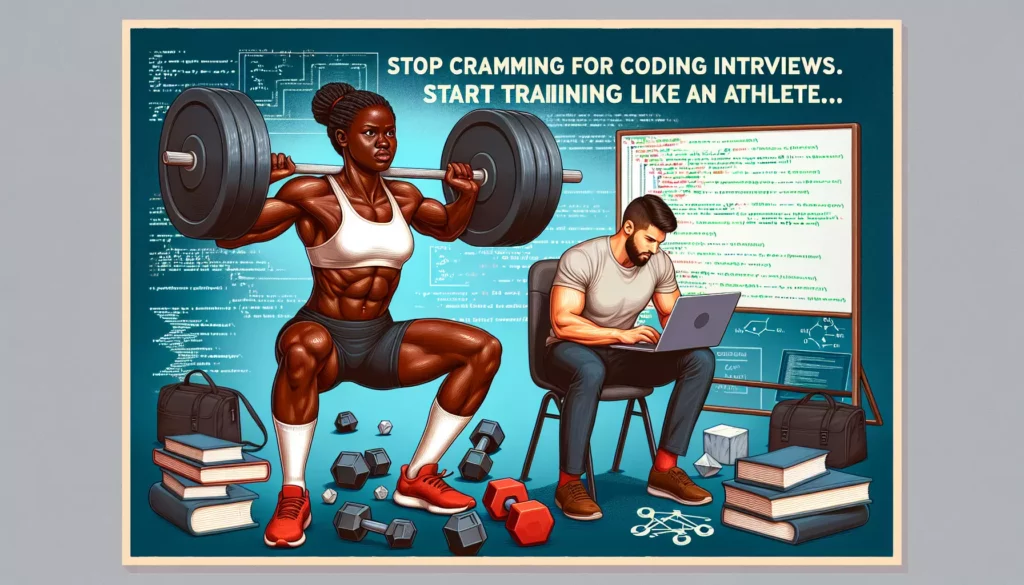Stop Cramming for Coding Interviews. Start Training Like an Athlete.

Generating interview opportunities is pointless if the developer cannot pass the interviews. You can have the perfect resume, an impressive LinkedIn profile, and a strong network that lands you call after call—but without solid preparation, those opportunities will slip through your fingers. The key is to approach interview prep strategically, not frantically.
Master the Behavioral Round (Yes, It’s Actually the Easiest)
Here’s the good news: the behavioral interview is often the easiest round to prepare for, yet many developers stumble through it. The problem isn’t a lack of experience—it’s a lack of practice presenting that experience clearly and confidently.
Developers frequently need to work on three things: confidence, clarity, and conciseness. Technical brilliance doesn’t shine through if you ramble, sound uncertain, or can’t articulate your thought process.
Here’s how to nail it:
Practice out loud. This cannot be emphasized enough. Answering questions in your head is not the same as speaking them. Set a timer, record yourself, or grab a friend. Practice the most popular behavioral questions: your strengths and weaknesses, examples of teamwork, conflict resolution, times you failed, and how you handle feedback.
Use the STAR method. Structure your answers using Situation, Task, Action, Result. This framework keeps you focused and prevents rambling. For example:
- Situation: “Our team was falling behind on a critical feature release.”
- Task: “I needed to identify the bottleneck and get us back on track.”
- Action: “I organized a quick retrospective, identified that unclear requirements were causing rework, and set up daily syncs with the product manager.”
- Result: “We delivered on time and reduced back-and-forth by 40%.”
Script your essentials. Write a simple, bullet-pointed script for the most common questions, especially “Tell me about yourself.” This isn’t about memorizing word-for-word—it’s about having a clear framework so you don’t freeze or over-share. Keep it focused on your professional journey, relevant skills, and what you’re looking for next.
Tailor Your Technical Prep to the Company
Not all interviews are created equal, and your technical preparation should reflect that reality. An educated guess about the likely interview format can save you weeks of misdirected effort.
Big Tech companies (Google, Meta, Amazon, Microsoft, etc.) are notorious for their heavy focus on Data Structures and Algorithms. Expect LeetCode-style problems, system design discussions, and questions that test your ability to optimize for time and space complexity. If you’re targeting these companies, there’s no way around it—you need to grind DSA.
Midsize companies tend to be more practical. Instead of asking you to invert a binary tree, they might ask you to design a React component with specific functionality, build a simple REST API in Python, or debug a piece of real-world code. These interviews test whether you can actually build things, not just solve puzzles.
Startups typically care less about textbook algorithms and more about your ability to ship features quickly. They want to see that you can wear multiple hats, work with ambiguity, and contribute from day one. DSA questions are far less common here—expect take-home projects, pair programming sessions, or conversations about your past work.
Do your research. Look at interview experiences on Glassdoor, Blind, or Levels.fyi. Ask your recruiter what to expect. Tailor your prep accordingly.
Consistency Beats Cramming Every Single Time
Here’s the uncomfortable truth: cramming the week before an interview rarely works. You might scrape by on memorized patterns, but you’ll be nervous, shaky, and one curveball question away from falling apart.
The developers who consistently pass interviews are the ones who write code every day—not just when they’re actively job hunting. They solve mini problems, work through DSA questions over several months, and build small projects that keep their skills sharp.
This approach does two powerful things:
- It reduces nervousness. When you’ve been consistently coding, interviews feel less like high-stakes exams and more like conversations about something you do regularly.
- It builds genuine confidence. You’re not faking it or relying on recently crammed knowledge—you actually know your stuff.
Think of it like going to the gym. You can’t cram fitness the week before a marathon. You build it gradually, over time, so that when race day comes, you’re ready.
The bottom line: Interview preparation isn’t about heroic last-minute efforts. It’s about smart, continuous practice. Master the behavioral basics, tailor your technical prep to the companies you’re targeting, and make coding a daily habit—not a pre-interview panic. Do this, and you won’t just get interviews. You’ll pass them.

